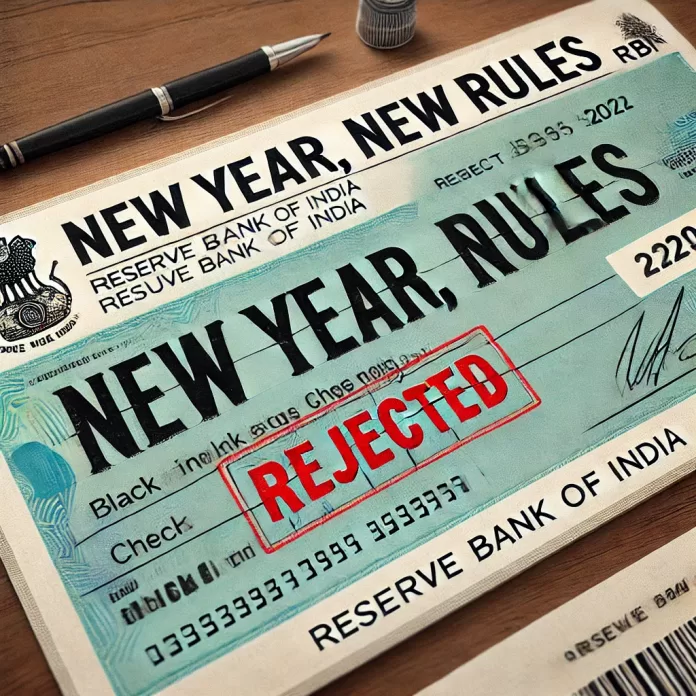The financial ecosystem constantly evolves to address emerging security threats. One of the latest changes introduced by the Reserve Bank of India (RBI) is Black Ink Banned on Cheques. Effective January 1, 2025, this rule mandates that cheques must be written exclusively in blue or green ink. This initiative, aimed at minimizing fraud, marks a significant step toward reinforcing transactional security and safeguarding customers.
Why Is Black Ink Banned on Cheques?
The rationale behind this change stems from the vulnerability of black ink to tampering. Black ink, commonly used in documents, is more susceptible to alterations due to its ease of erasure using modern chemical solvents. Fraudsters can remove black ink from cheques and manipulate the content, leaving unsuspecting individuals and institutions at risk of financial losses.
Blue and green inks, on the other hand, are less prone to such alterations due to their chemical composition. These colors offer better visibility under ultraviolet light and are easier to detect during verification processes. By enforcing the use of these inks, the RBI aims to create a more secure cheque payment environment, deterring fraud and promoting transparency.
New Guidelines and Their Implications
The RBI has outlined specific rules regarding the use of ink on cheques:
- Mandatory Colors: Cheques must be written in blue or green ink.
- Applicability: This rule applies to all types of cheques, including personal, business, and government-issued ones.
- Rejection of Non-Compliant Cheques: Banks will not process cheques written in black ink, requiring customers to issue new ones in the prescribed colors.
This directive impacts both individual account holders and businesses. While some may find the change inconvenient initially, the long-term benefits of enhanced security outweigh the minor adjustments required.
Educational Benefits of the Change
- Increased Awareness:Customers are encouraged to understand the importance of ink selection in cheque security. The emphasis on education ensures that users are better equipped to prevent fraud.
- Improved Banking Practices:The ban on black ink promotes the adoption of best practices, ensuring consistency in cheque writing and verification.
- Fraud Prevention:By minimizing the chances of tampering, this rule protects both individuals and institutions from significant financial losses.
- Digital Alternatives:This change also serves as a reminder of the growing importance of digital payment systems, which offer even higher security levels. Customers are encouraged to explore digital platforms as a complement to traditional cheque transactions.
Reactions from the Public and Experts
The ban on black ink has elicited mixed responses from the public. While some view it as an unnecessary inconvenience, others appreciate the proactive approach to preventing fraud.
Rohan Patel, a local businessman, shared his perspective: “It’s a simple yet effective measure. Spending an extra moment to use blue ink is a small effort for the added security it provides.”
Banking experts have also lauded the move, emphasizing its significance in enhancing the security of the cheque-clearing system. “This initiative reflects the RBI’s commitment to protecting customers from evolving threats,” remarked a senior banker.
Steps for Compliance
To comply with the new rule, customers should:
- Use pens with blue or green ink for all cheque writing.
- Ensure the ink is of good quality to prevent fading or smudging.
- Verify that their cheques meet all other security and format requirements.
Banks have started distributing information leaflets and displaying notices to educate customers about this change.
The Future of Cheque Transactions
This move highlights a broader shift in the financial sector toward greater security. While digital payments are gaining popularity, cheques remain a vital tool for many transactions. Ensuring their security is crucial for maintaining customer trust in traditional banking systems.
Moreover, this change could pave the way for additional security measures, such as introducing enhanced cheque designs with integrated anti-fraud features.
The RBI’s decision to ban black ink on cheques marks a significant stride in improving banking security. While the change may require adjustments, its long-term benefits in fraud prevention and customer protection are invaluable. By adopting the prescribed ink colors and staying informed about banking regulations, customers can contribute to a safer and more secure financial ecosystem. This step is a testament to the evolving nature of banking practices, prioritizing security and innovation.














